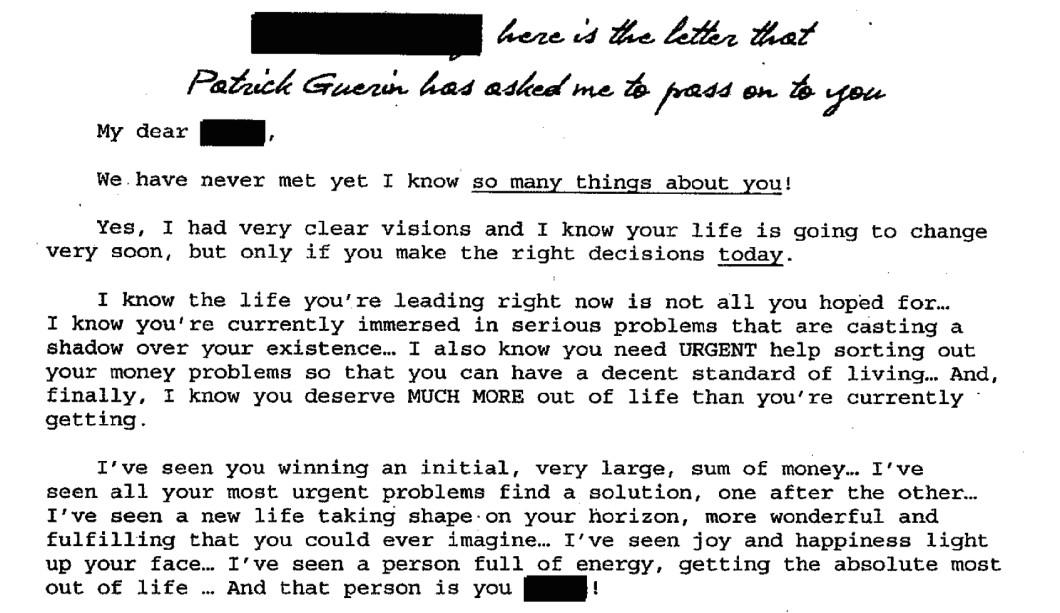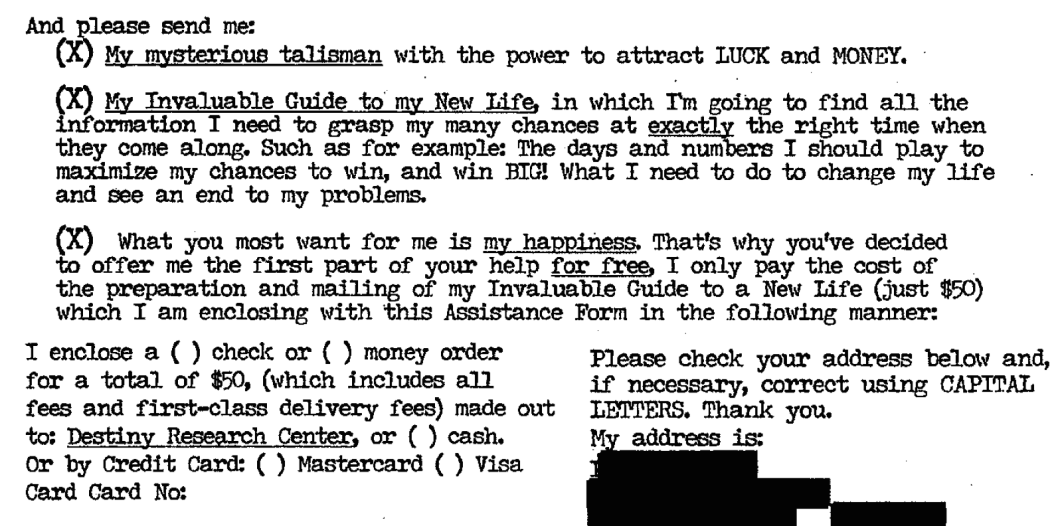Feds Shut Down Psychic Scammers Who Tricked Victims Out Of $180 Million
We first wrote about the “Maria Duval psychic mailer” scheme, which used supposedly personalized mass mailings to trick people into paying money for Duval’s otherworldly insights, more than six years ago, and the internet is full of complaints from people who lost thousands of dollars to Duval and her related businesses. Today, the U.S. Department of Justice announced a settlement that permanently bars Duval and others from continuing to bilk consumers out of their money with false promises of psychic guidance.
In 2014, the DOJ sued New York-based company Data Marketing Group and Quebec’s Infogest Direct Marketing for partnering with Hong Kong-based Destiny Research Center to send out millions of pieces of mail in the name of Duval and another alleged psychic Patrick Guerin, both of whom licensed their likenesses to the company.
Though the mailers were nothing more than junk mail, they were crafted to look like personalized letters to each of the recipients, declaring that Guerin and/or Duval had personal knowledge of the recipient and that they had been predicted to, for example, win the lottery or some other large sum of money:

But in order to make that psychic prediction come true, explained the letters, the recipients needed to first pay up. That could mean being charged $50 for a good luck talisman and a pamphlet:

Victims who were reeled in through the initial mailers were subsequently sent more supposedly personalized demands — send us some of your hair, a photo, and a check for $45 to get a “personal astral-clairvoyant forecast” — with further promises of connection with Duval or Guerin, though it appears that neither of these “psychics” ever saw any of the correspondence.
The mailings did include disclosures that “individual results may vary” and that the whole psychic thing was “For novelty and entertainment purposes only,” but these disclaimers ran vertically along the edges of the page, in deliberately blurred microprint; not an ideal disclosure for mailers targeted primarily at older recipients.
Maybe you’re probably thinking “I would never fall for this.” Congratulations. However, many of the people who received some of the 56 million mailers sent out over the last decade weren’t as savvy.
According to the DOJ complaint, Data Marketing Group was processing upwards of $500,000 in payments to Destiny Research Center every two weeks. In total, the government estimates that in the U.S. alone the companies involved made more than $180 million.
Canadian company Infogest has been handling Duval’s direct mail operations for nearly two decades, first under the name of Zodiac Zone. In 2007, the U.S. Postal Service issued a cease-and-desist order to Zodiac Zone and Duval, directing them to cease sending mailers pretending to be personal correspondence with intimate knowledge of recipients’ personal details, when in fact the recipients were just picked from a direct mail marketing list of names and addresses.
While that order might have stopped the Zodiac Zone mailers, the DOJ says that the Destiny Research letters are virtually identical to the ones the USPS ordered Duval to stop sending.
The 2014 lawsuit was amended in 2015 to add both Duval and Guerin as defendants.
As part of the settlement, all the defendants have agreed to permanently cease using the U.S. mail to make claims that they can sell products or services that will, for example, increase the recipient’s odds of winning the lottery or bring the recipient luck or good fortune.
The defendants are also prohibited from using or selling the lists of consumers who responded to the Duval and Guerin mailers.
“To line their own pockets, the defendants preyed upon the superstition and desperation of millions of vulnerable Americans,” said United States Attorney Robert L. Capers.
Earlier this year, CNN.com produced an in-depth investigation into the long-running Duval scam that is definitely worth a read.
Want more consumer news? Visit our parent organization, Consumer Reports, for the latest on scams, recalls, and other consumer issues.

